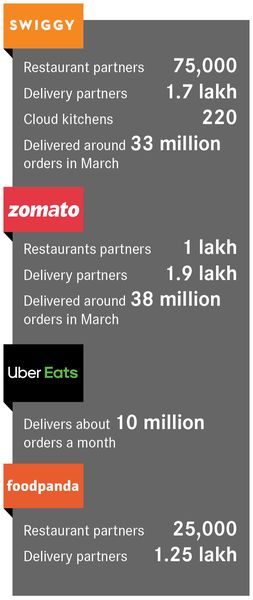FEW THINGS HAVE changed urban India’s dining habits like food aggregator apps have done in the past four years. Restaurants are even tweaking their business models to cash in on the popularity of the likes of Swiggy, Zomato and Uber Eats. The homegrown coffee shop chain Cafe Coffee Day, for instance, has a ‘virtual restaurant’ at its outlets to cater to orders from these platforms. Global brands like Kentucky Fried Chicken, Subway and McDonald’s have separate teams to manage orders from these platforms.
The online food-delivery market in India is pegged at around Rs 51,000 crore. Bengaluru-based Swiggy, which is India’s fastest startup to become a unicorn (startups with valuation exceeding $1 billion), delivered about 33 million orders in March. Its main rival, Gurugram-based Zomato, delivered around 38 million orders in the month. Both companies are now focusing on geographic expansion. Zomato claims it has a larger footprint, with presence in 170 cities and about a lakh restaurants live on the platform. Swiggy has tie-ups with around 75,000 restaurants across the country and about 1.7 lakh delivery partners.
Swiggy has big plans to leverage this army of delivery partners. For instance, it recently started the ‘Store’ service in Gurugram, which delivers from fruit and vegetable stores, florists, kiranas, supermarkets and pharmacies. The focus, however, continues to be the food delivery business. “India is still a food supply deficit market,” said Vivek Sunder, chief operating officer of Swiggy. “We are far behind in restaurant per capita compared with South East Asia and Brazil. We launched Swiggy Access in 2017 to address these geographical gaps in restaurant supply. It is building hundreds of pods to help thousands of small, medium and large restaurants expand to newer locations and cities and drive more business. Access is also enabling inter-city expansion for its restaurant partners. For instance, Vasudev Adigas, a flagship south Indian restaurant from Bengaluru, is now available to consumers in Delhi through Swiggy Access.”
Zomato overcame the substantial supply deficiency in the market, especially in small towns, through cloud kitchens. Called Zomato Kitchens, this initiative drives supply by enabling small players to supply food. It has also been enhancing its tie-ups with restaurants. “We offer all the services that a restaurant may require at any given stage of the business,” said Mohit Kumar, chief operating officer, food delivery for Zomato. “We can help them increase their footprint with Zomato Kitchens, procure high-quality ingredients, drive discoverability, branding and marketing through our restaurant discovery and reviews, cover online orders and last mile delivery through the online ordering platform and guide them towards safety and hygiene standard compliance. We are building a platform designed to provide end-to-end functional services.”
Bengaluru-based Foodpanda, which is one of the oldest players in the sector, is now banking on its cloud kitchen network to take the business to the next level. “Foodpanda aims to build India’s largest cloud kitchen network,” said a spokesperson for the company. “The platform looks to bring together several in-house brands across various categories and cuisines to its customers.” The company recently acquired Holachef, a Mumbai-based kitchen, which has helped it go deeper into the ecosystem.
Restaurants, however, remain the bread and butter of these platforms. Restaurants and food delivery platforms work closely with each other. Uber Eats, for instance, tied up with Cafe Coffee Day a few months ago to launch India’s largest virtual restaurant network. As part of the partnership, Uber Eats provides the coffee shop chain with data, analytics and insights, in addition to delivering food. Tea retail chain Chai Point’s all new cafes have exclusive counters for delivery partners of these platforms.
While technology is the backbone of food delivery platforms, the biggest disruption may still be in the making. Zomato is working on using drones for delivery. “Drone delivery will help us target more users,” said Kumar. That might take a while to happen, but these companies are already trying many innovative methods. Some of them, for instance, have tied up with the bicycle aggregators. “This delivery is still in a nascent stage though I feel it is a logical step when compared with the delivery by drones which I feel will take time to get popular as there are still regulatory policies which have to take shape,” said Rohan Agarwal, engagement manager at RedSeer Consulting.
Agarwal is of the opinion that most traction for these markets will come in from the bigger cities and cloud kitchens will be more popular in the periphery areas of such cities where there are not enough restaurants. “These companies in the near future will also be focusing on more strategic tie-ups with local restaurants, rather than promoting their own private labels in order to win the trust of local restaurants,” he said. “Many of them will also be focusing on using more and more artificial intelligence in their apps for improving their service. The AI tools will help them analyse customer demands better. AI will also be used for predicting delivery time for consumers.”



